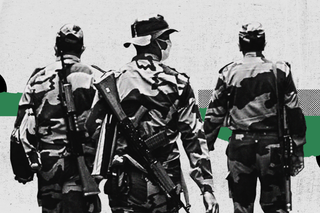
CRPF Initiates ‘Talking Circles’ To Prevent Suicides
The pressure not to talk about feelings or cry may be contributing to a rise in suicides in the army, a note about the move said.

The Central Reserve Police Force (CRPF) circulated a note to its zonal headquarters, instructing them to put in place a system of weekly “chaupals“, or a form of a talking circle. This is to encourage personnel to interact with one another outside a work context and share feelings. The move is reportedly in response to concern over a rising rate of suicides within the CRPF.
Indeed, the home ministry stated this year that more CRPF, BSF, and SSB personnel died by suicide than in combat in the last six years. Among all Central Armed Police Force (CAPF) branches, the CRPF reported the highest number of suicides. By 2020, there had been a 55% rise in the number of suicides in the CRPF since 2015, according to government data. The government cited “personal and domestic problems” as reasons behind the alarming rise.
“These days, the presence of social media also throws up problems. Everything that is happening at home is immediately known to the jawan, who cannot go back home, leading to depression and helplessness,” a CRPF officer told The Print last year.
In light of the situation, the CRPF’s acknowledgment of the tendency among personnel to suppress stress being harmful is a positive development. “A force like the CRPF is predominantly made up of men. Socially, men are assumed to be ‘strong,’ and they are not expected to cry or be emotional… To conform to this societal image, male personnel often do not share their worries even with their comrades, and keep them bottled up within,” a note issued last month stated.
The note also cited global studies that found that those who are unable to share their feelings are more likely to think about killing themselves.
The “chaupals” will include personnel from all ranks participating in a “group sharing exercise.” In a 1 or 2 hour duration, the space is intended to allow individuals to talk about their problems without judgment or “laughter” from other members of the group, and create an informal atmosphere to talk about things outside work and operations.
The move, while arguably a step in the right direction towards addressing the culture of toxic masculinity in the army, still falls considerably short. Working hours, low pay, an atmosphere of constant violence, and few leaves are all issues that contribute towards poor mental health amid personnel, leading to one jawan describing his experience as “slavery.”
Related on The Swaddle:
Almost 800 People in India’s Armed Forces Have Died by Suicide Since 2014: Govt Data
“Steps are taken urgently, which are mostly patch-up steps and not systematic changes,” Rajat Mitra, a clinical psychologist who deals with mental health in the armed forces, told Vice about the phenomenon. He added that the forces are guided by a colonial model, in which the troop’s commander doubles as a counselor. Proper mental health care, therefore, is severely compromised — a situation that can quickly turn dangerous given the conditions of high stress, loneliness, and trauma that the forces deal with regularly.
There is also the fact that there is little room for troopers to complain or speak up about issues within the forces themselves or point to any systemic problems. As a result, it appears that the “talking circle” is confined to discussing “personal” problems like marital issues, and abstract feelings of loneliness or stress without addressing the root cause and effecting tangible changes. The doctrine of “obedience without question” adds to this problem, according to VK Sharma, the CRPF’s former director inspector general.
With political unrest increasing in the country by the day, the problem stands to worsen. Significantly, many of the suicides are from Jammu and Kashmir, which recently became the most militarized zone in the world. Parts of the North East routinely see increased dispatches of forces on account of rising tensions.
But the emphasis on “personal” problems and measures such as creating studio apartments for newly married jawans to spend time with their spouses, are all missing the point. Rather than meaningfully questioning the constant violence that personnel are subjected to, the insistence on drawing a firm boundary between the “personal” and the “official” conceal the problem at hand: that mental health is often relegated to the “private” realm where the government does not see fit to interfere.
There is, however, a considerable overlap. A 2012 IIM Ahmedabad study found that the most serious issue leading to stress was the lack of leave. Researchers found that leave applications took a long time, and were not granted in time for functions or occasions for which personnel wanted to go home.
Although authorities had taken a few steps towards setting up mental health counseling services and workshops, these are way behind the level of institutional support that is required. It is also worth noting that the concern for the army’s mental health was renewed in the aftermath of an incident of fratricide, in which a jawan opened fire on his colleagues, killing four. Many efforts, it would seem, are geared towards putting personnel more in touch with their feelings. But how effective these would be when the call of duty asks for these same feelings to be suppressed to kill — indeed, when killing, dehumanization and violence are routinely normalized — remains to be seen.
Rohitha Naraharisetty is a Senior Associate Editor at The Swaddle. She writes about the intersection of gender, caste, social movements, and pop culture. She can be found on Instagram at @rohitha_97 or on Twitter at @romimacaronii.
Related


Gwyneth Paltrow’s ‘Sex, Love & Goop’ Leaves Sexologists Concerned
